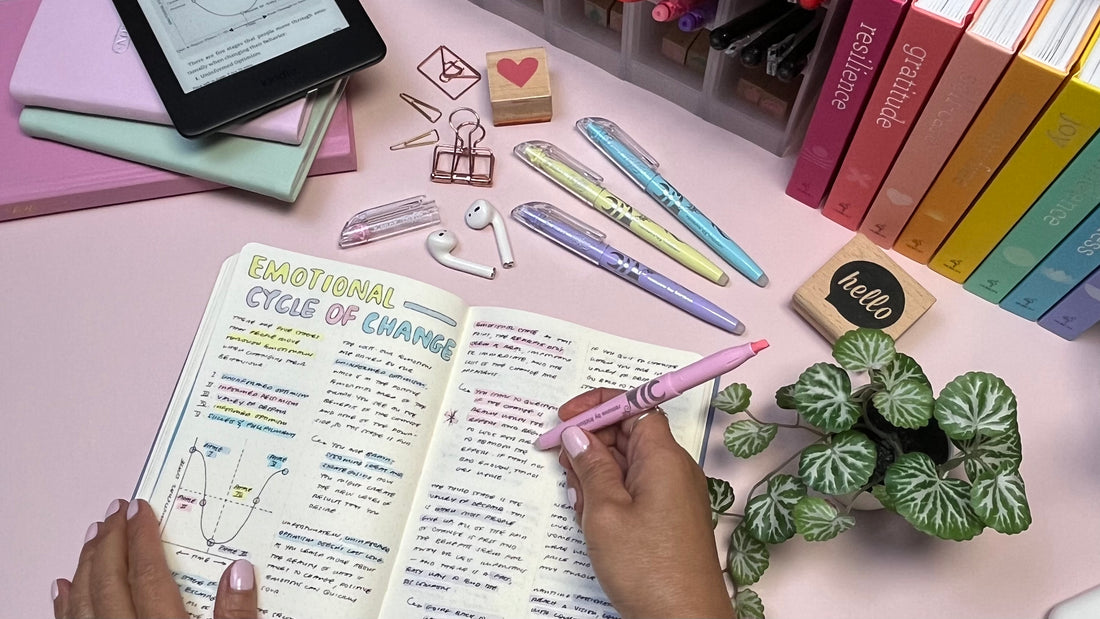
Why journaling is good for your mind, body & soul
Mariane Cresp loves journaling, planning and organising for self-care, productivity and well-being. Here, Mariane shares her joy of planning for mental health and personal growth.
Why journaling is good for your mind, body & soul

What are the benefits practically, emotionally and mentally?
Planning out the day, week and the months ahead helps with organisation and time management by having appointments and self-care breaks scheduled and written down. It helps prioritise urgent and non-urgent tasks, which reduces overwhelm and stress. By writing things down on paper, it gives space to focus on the tasks at hand, allowing clarity of thought and the art of writing itself is a great form of mindfulness.
What sort of equipment do you need? Do you need lots of books and pens?
To start off, all you need is a simple notebook, your favourite pen, highlighters and colourful markers to be able to plan your day effectively and also create beautiful pages that you will more likely use again and again.
How much time does it take? How often do you do it?
It can take anywhere from 5 - 30 minutes at a time. If I am short of time, I quickly jot down quick tasks and to-dos for the day. When I do have time, my journaling includes writing down my thoughts, mood, self-reflection, gratitude journaling, memory keeping, braindump and more. This is so important as part of my self-care, mental well-being and keeping self-doubt, overwhelm and stress at bay. By writing all these down on paper, it allows for space for me to reflect and be able to see things with more clarity.
Does it make you inflexible and unable to adapt?
It’s very important to be flexible and adapt to whatever curveballs the day brings. Don’t be afraid to cross things off your planner if you change your mind or if things get cancelled. This is why I love using erasable pens and markers because you can easily erase any changes and reschedule for another day and time without messy mistakes on the page!
If you could recommend one daily planning/journaling practise, what would it be?
It is important to write things down as you are more likely to action it than not. Write down what you need to do and when. One of the 4 Laws of Behaviour Change according to James Clear’s book “Atomic Habits” is to “make it attractive” and so it’s worth taking the time to add some colour with a nice layout to create a beautiful page.
What benefits have you personally experienced through your daily planning and journaling practise?
The act and art of writing in my planner and journals has been beneficial for me not just to help retain information, but to write down my goals, in prioritising my tasks and time management. It’s been a powerful tool to help me get my thoughts and feeling down on paper, self-reflect on my wins of the day, what I am grateful for and help me achieve mental well-being.
Mariane's tops tips

1. Desk Inspo - set up a dedicated desk that inspires productivity and creativity, making sure you have everything you need to brainstorm ideas and define your priorities.
Gather essential supplies like a high-quality planner, notebooks, and your favourite pens and markers. Having the right tools will help enhance your planning experience.
2. Review - check in and see where you're at. Think about those goals you wrote down at the start of the year and see what you have ticked off the list and what you have already achieved. Maybe you've finally started that side hustle you've been dreaming of, or perhaps you've hit a fitness milestone.
3. Celebrate - take a moment to acknowledge even the tiniest achievements. Celebrating these milestones not only boosts your motivation but also strengthens the positive habits you've been building. Mark them in colour in your planner. By creating visual victory logs, you see your progress and growth which helps remind you of how far you’ve come.
4. Re-define - now that you've taken a good look at how things are going, it's time to rethink your objectives. Some might just need a little fine-tuning, like your diet and exercise routine, while others could use a complete pivot. Colour code them with highlighters, as this helps to visually see what needs be amended.
5. Map Your Progress – to stay on track, check in with your goals regularly. Mark off completed tasks on your habit tracker to help motivate you. Charting your progress can give you a boost to help you stay on track. As the year progresses, make sure to regularly assess your strategies and adjust them as needed. Jot down lessons learned and the insights you have gained, using each moment as stepping stones towards achieving your objectives throughout the rest of the year.
6. Create Time - schedule regular planning sessions in your calendar and treat them as non-negotiable appointments with yourself. Time block dedicated time for goal setting, reflection, and planning.
7. Stay open – they say ‘Life is what happens whilst you’re busy making other plans,’ so make sure you stay open to surprising opportunities along the way – embrace what's to come, and keep in mind that every little step forward counts toward reaching those big dreams of yours!

Visit Mariane Cresp on Instagram via HERE.


